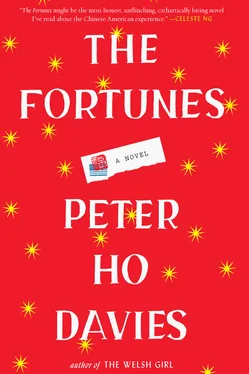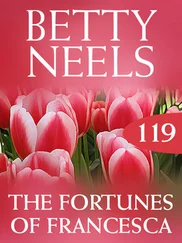The blow to the chest broke a jade charm, a little carved elephant that had been his mother’s, that Vincent wore on his chain — a bad omen to Chinese, though you hardly needed an omen to foretell what was coming next.
The ambulance took him to Henry Ford Hospital, the same hospital he used to take his dad for dialysis, where he lingered for a few days, his mother by his bedside, calling him—“Vincent! Mama coming. Vincent! Mama coming”—as if from a great distance, before she finally gave consent to turn him off. The same hospital where they told her thirty years earlier that she’d never have a child.
I couldn’t look at his mother at the funeral, or at Vicki beside her, her eyes veiled by oversized shades. Instead I concentrated on this girl I knew called Patty, a friend of Vicki’s, standing with them on the other side of the grave. She was a nervous thing, this Patty, loud and fidgety, but stilled now in her grief, her pale skin glowing against her dark blouse (half the mourners were in white, the traditional color of Chinese mourning, half in black). I realized how beautiful she was. I yearned to comfort her, imagined moving to her across the open grave as if I could walk on air. She was going to be a bridesmaid, and Vincent had promised to set me up with her, but I’d been doubtful, wary. “She’s into you, man,” he’d assured me with a nudge. Now she wouldn’t meet my eye.
I watched them walk away after, the older woman between the two younger, leaning against each other for balance when their heels sank into the turf. Then I filled a spadeful of earth, watched it slide off the bright steel blade into shadow.
If you remember the case at all (and maybe it’s coming back to you?), if you were watching TV back then, you might recall her, Vincent’s mother — Lily — going on Donahue (remember him?), or meeting with Jesse Jackson (remember him ?) at one of his presidential campaign rallies. She put the yellow in the Rainbow Coalition, people said.
She still had one of those comedy Chinglish accents: What I live for? I don’t have happy anymore. I not care my life. The kind of accent that makes my generation cringe; Vincent used to do a choice imitation of it. But her voice cracked, daring anyone to laugh, daring anyone to feel embarrassed. Vely hurt my heart.
To me, watching at home, Phil leaning in solicitously looked disconcertingly like Evans — the same pasty complexion, the same shock of white hair. Laugh and I’ll kill you, I thought.
Lily. But Mrs. Chin to me, always. Just another mom, but stouter, shriller, fiercer, and more doting than all the rest, so that she seemed somehow like everyone’s mother. (Everyone else’s; mine had died of throat cancer before I turned seven.) When we were kids she always had treats — egg tarts, mooncakes in fall, her homemade prawn crackers — and praised my good appetite. When we grew up she was always asking when I was going to get married, telling Vincent to introduce me to some nice girl (to which he would roll his eyes, though whether for my benefit or hers, I was never quite sure).
All I learned about her life came from the papers. Some of it I doubt even Vincent knew. She’d grown up in Canton. Her family owned a department store. They must have been well-off, but they lost it all in the war. She’d come from China in ’47 to marry his dad, who’d lived here since the twenties and earned his citizenship by enlisting. Mrs. Chin’s own father had resisted the match — an ancestor had worked on the railroads and been driven out — but she was sure it would be a better life. She’d seen so much violence in China at the hands of the Japanese, she wanted to start over. She’d have been twenty-seven — old to marry, delayed by the war — and Vincent’s dad even older at forty-four. I guess they tried to start a family of their own, but she miscarried and the docs told her she couldn’t have kids. It took them more than a decade to adopt Vincent from Hong Kong. His dad was in his late fifties by then, and even Lily in her forties — the oldest parents of anyone I knew.
They worked their whole lives in laundries and restaurants. “For what?” Vincent asked me savagely during his father’s final illness. “They never had any fun.” We were outside in his drive, smoking, Mrs. Chin framed in the kitchen window washing rice as if panning for gold. I knew what it was to lose a parent; I’d come to pay my respects. I didn’t know his father well — what I remember most is his sure-handed ability to pluck out a fish’s eyeball with his chopsticks, a deftness that impressed me as a child almost as much as his relish in eating it appalled me — but I knew the answer to Vincent’s question. For what? For you! It was the same for all of us kids. The debt he could never redeem, no matter how late he sat up rubbing the old man’s swollen knuckles when he couldn’t sleep.
“If life gives you lemon,” Mr. Chin used to joke, “make lemon chicken!” I assumed he made it up till I saw it in a fortune cookie.
First his dad, now Vincent himself. Part of what was so moving was that his mother’s desire for justice, her thirst for vengeance, they were ways of forgiving his most unfilial act: dying before her (beside which sneaking off to strip clubs under Vicki’s nose was a pale betrayal). The night it happened, when I finally got home from the hospital and told my father everything, he pulled me close and hugged me. I couldn’t remember the last time we’d touched. I thought I’d failed my friend, but it turns out I’d been a good son.
Vincent was the same age when he died as his mother had been when she started her new life in America.
After his death, to support herself, she went back to work for a while at a local factory, making those little plastic ice scrapers for windshields.
They called themselves the ACJ, American Citizens for Justice — no mention of Chinese or Asian in the name — and insisted that placards at marches be in English, which may explain the painful, plaintive pun of CHIN UP FOR JUSTICE on one popular sign. But they’re the ones — journalists, lawyers, church leaders, and local businessmen — who helped Lily get the case reopened. And their coming together — Chinese and Japanese, those old enemies, as well as Korean, Vietnamese, Filipino — marked the start of a pan-Asian political movement. And me along with the rest, attending meetings, giving interviews, marching beneath a neatly lettered sign. You could say it’s when we became Asian American. Two drunk white guys couldn’t tell us apart, and we realized we were more alike than we’d thought.
There’d been Asian student coalitions and alliances and collectives when I was in Palo Alto — holdovers from the antiwar movement — but I’d kept my nose in my books (my “political” involvement at Stanford began and ended with my vote for the football team to be called the Robber Barons; the administration shot that one down). Vincent and I had missed the draft by a couple of years, but he’d always said he’d serve if called, “like my Dad” (I always said Canada was a thirty-minute drive).
“Pan-Asian,” I could imagine Vincent joking, for Mike or Jerry’s benefit. “What is that, like a wok?” “Sure, a melting wok!” I’d say, and we’d all laugh.
The first meetings were held in the Golden Star, the restaurant where Vincent had worked, everyone sitting around the freshly laid tables — vinyl tablecloths and melamine rice bowls — trying not to disturb the settings, looking less angry or sad in that context than hungry. It reminded me of his funeral the previous summer, only these weren’t all the same people who’d come then. I didn’t know many of them; many of them didn’t know Vincent, and yet they spoke of that night as if they’d been there, as if they’d been attacked. In a way, I guess, they felt they had, if not by Evans, then by the verdict.
Читать дальше












